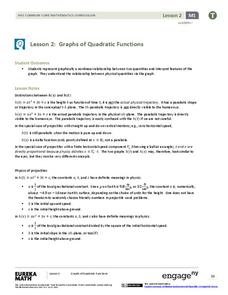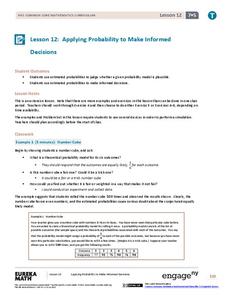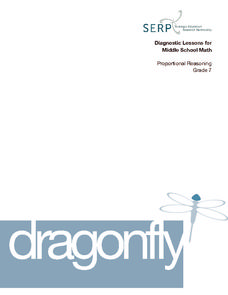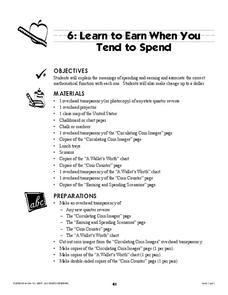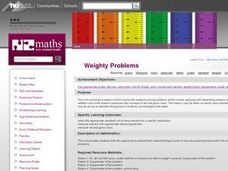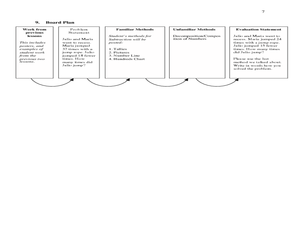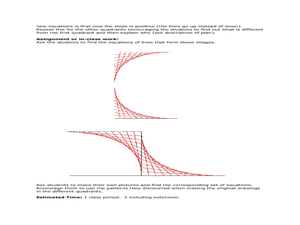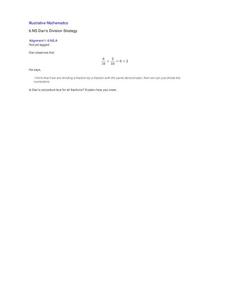EngageNY
The Power of Algebra—Finding Pythagorean Triples
The Pythagorean Theorem makes an appearance yet again in this lesson on polynomial identities. Learners prove a method for finding Pythagorean triples by applying the difference of squares identity.
EngageNY
First-Person Computer Games
How do graphic designers project three-dimensional images onto two-dimensional spaces? Scholars connect their learning of matrix transformations to graphic design. They understand how to apply matrix transformations to make...
EngageNY
Law of Cosines
Build upon the Pythagorean Theorem with the Law of Cosines. The 10th part of a 16-part series introduces the Law of Cosines. Class members use the the geometric representation of the Pythagorean Theorem to develop a proof of the Law of...
EngageNY
Truncated Cones
Learners examine objects and find their volumes using geometric formulas in the 21st installment of this 25-part module. Objects take the shape of truncated cones and pyramids, and individuals apply concepts of similar triangles to find...
EngageNY
Graphs of Quadratic Functions
How high is too high for a belly flop? Learners analyze data to model the world record belly flop using a quadratic equation. They create a graph and analyze the key features and apply them to the context of the video.
EngageNY
Interpreting and Computing Division of a Fraction by a Fraction—More Models II
No more inverting and multiplying to divide fractions. Applying concepts of measurement division from the previous lesson plan, pupils consider partitive division using fraction bars and number lines. They first convert fractions to like...
EngageNY
Using Linear Models in a Data Context
Practice using linear models to answer a question of interest. The 12th installment of a 16-part module combines many of the skills from previous lessons. It has scholars draw scatter plots and trend lines, develop linear models, and...
Workforce Solutions
Egg-streme Sports
Challenge small groups to build a structure that catches a raw egg without breaking—working collaboratively and applying mathematical and engineering principles. Pretending the frame was made by a business, scholars create a marketing...
Curated OER
A Rectangle in the Coordinate Plane
A quadrilateral is drawn on the coordinate plane, and eighth grade geometers find the length of each side and the diagonals by applying the Pythagorean theorem.
Curated OER
Applied Science - Science and Math Pre Lab
Students find Fibonacci sequences. In this applied Science lesson, students solve Fibonacci sequence problems. Students explore the mathematical patterns of objects in nature.
Curated OER
Measuring the Earth
High schoolers use principles of geometry to measure the circumference of the Earth. In this applied geometry lesson, students use mathematics to determine scientific information. They make measurements, calculate the central angle, and...
EngageNY
Applying Probability to Make Informed Decisions
Use simulations to determine the probabilities of events to make decisions. Class members are presented with several scenarios, some with known probabilities and others without. Groups run simulations to gather data that they then use to...
Curated OER
Dragonfly
The speed of a dragonfly brings math into the real world as your learners collaboratively see the value in calculating unit rates in direct proportion problems. This six-phase lesson encourages you, as the teacher, to only ask questions...
Curated OER
Learn to Earn When you Tend to Spend
Analyzing and understanding word problems is extremely important. Pupils learn that in money problems, earn usually means you add and spend usually means you subtract. They will solve a series of money-related word problems, label coins,...
EngageNY
Linear Transformations Applied to Cubes
What do you get when you combine a matrix and a cube? Well that depends on the matrix! Pupils use online software to graph various transformations of a cube. Ultimately, they are able to describe the matrix that is responsible for a...
Curated OER
Mass: Applying and Interpreting
Students rotate through six studying stations solving problems that involve applying and interpreting aspects of mass. They solve various word problems, and measure the contents of cans and calculate the mass of two cans.
Curated OER
Mathematics Lesson Plan
Second graders study subtraction facts. In this mathematics instructional activity, 2nd graders discuss how to solve two digit subtraction problems. Students recognize that there are many different methods or strategies one can use such...
National Wildlife Federation
What is DBH?
When measuring the circumference of a tree, does it matter how high you place the measuring tape? Most scholars have never considered this question, but scientists know that measurement techniques must be standardized. The 13th...
Curated OER
How to Apply Properties in Multiplication
Students study the commutative and associative properties. In this multiplication lesson, students review the properties and solve several multiplication problems.
Curated OER
Mathematics of Doodles
Students use the slope and y-intercept to graph lines. In this algebra lesson, students graph linear equations and apply it to solving real life problems.
Curated OER
Operation Spaghetti
Find the math in recipes. Young chefs will follow a recipe and investigate the total cost for materials. They measure amounts of food necessary for the recipe and compute the per person cost.
Illustrative Mathematics
Adding Multiples
Mathematicians practice communicating why the sum of two multiples of a number results in another multiple of that number. Encourage learners to construct a viable argument by applying the distributive property or by drawing a diagram....
Illustrative Mathematics
Dan’s Division Strategy
Can Dan make a conjecture about dividing fractions with the same denominators? That is what your scholars are to determine. They must show that if the statement is true, they understand how the quantities were determined, and how the...
Illustrative Mathematics
Voting for Three, Variation 2
Here is another opportunity for math students to apply reasoning to solve real-world problems with ratios. The ratio of the number of votes for two candidates is provided. Your class is asked to use this ratio and information given about...






